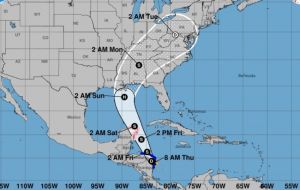MercoPress. South Atlantic News Agency
Tropical storm in Central America kills at least 22 people, and is moving towards Mexico
 The country hardest hit by the storm that began Wednesday was Nicaragua, with 11 dead and seven missing, Vice President Rosario Murillo told state media.
The country hardest hit by the storm that began Wednesday was Nicaragua, with 11 dead and seven missing, Vice President Rosario Murillo told state media.  Officials in Costa Rica said eight people died including a three-year-old girl, and two young Nicaraguan farm workers. At least 17 people were missing.
Officials in Costa Rica said eight people died including a three-year-old girl, and two young Nicaraguan farm workers. At least 17 people were missing. Tropical storm Nate has killed at least 22 people in Central America with torrential rains that forced thousands from their homes, uprooted trees, knocked out bridges and turned roads into rivers, according to officials on Thursday. The storm is moving to Mexico and United States.
The country hardest hit by the storm that began Wednesday was Nicaragua, with 11 dead and seven missing, Vice President Rosario Murillo told state media.
Officials in Costa Rica said eight people died including a three-year-old girl after they were hit by falling trees and mudslides, and two young Nicaraguan farm workers. At least 17 people were missing.
Costa Rica declared a national emergency as it struggled with mudslides, washed out roads and overflowing rivers. Schools, universities, government offices and banks across the Central American nation were closed. Three other people were killed in Honduras.
Nicaragua's Murillo added that 800 people had been evacuated, nearly 600 homes were flooded and 14 communities were isolated because of rains that had been falling for days.
More than 5,000 people were being put up in shelters in Costa Rica after having to abandon their homes because of flooding and the risk of unstable ground giving way, the director of the National Emergency Commission, Ivan Brenes, said.
At least 18 main roads were closed and another dozen were only partially open. In Costa Rica's northwest Guanacaste region popular with tourists many roads were so flooded as to be impassable to all but four-wheel-drive vehicles and horses.
As of Thursday night Nate was moving northwest along the east coast of Honduras and was expected to reach hurricane strength when it reaches the central Gulf of Mexico some time late Friday or early Saturday.
Storm or hurricane watches have been issued from Louisiana east through Mississippi and Alabama, the US National Hurricane Center said in a bulletin at 0300 GMT.
Some offshore oil and gas rigs in the Gulf of Mexico were being evacuated ahead of the storm, the US government Bureau of Safety and Environmental Enforcement said in a statement.
The United States is recovering from two major hurricanes: Hurricane Harvey that tore through Texas in August, and Hurricane Irma in September.
Another powerful storm, Hurricane Maria, ripped through the Caribbean in late September, wreaking destruction on several islands, including Dominica and Puerto Rico.
In Costa Rica, an alert was issued for people to be wary of crocodiles that might be roaming after rivers and estuaries flooded.
Concerned football officials were monitoring the situation and postponed a World Cup qualifying match between Costa Rica and Honduras from Friday to Saturday.
The annual rainy season is currently underway in Central America, a five-month period typically ending in November in which the risk of flooding and mudslides rise. This year's has been intense, with some areas in the region getting up to 50 percent more rain than average for September and October.




Top Comments
Disclaimer & comment rulesCommenting for this story is now closed.
If you have a Facebook account, become a fan and comment on our Facebook Page!